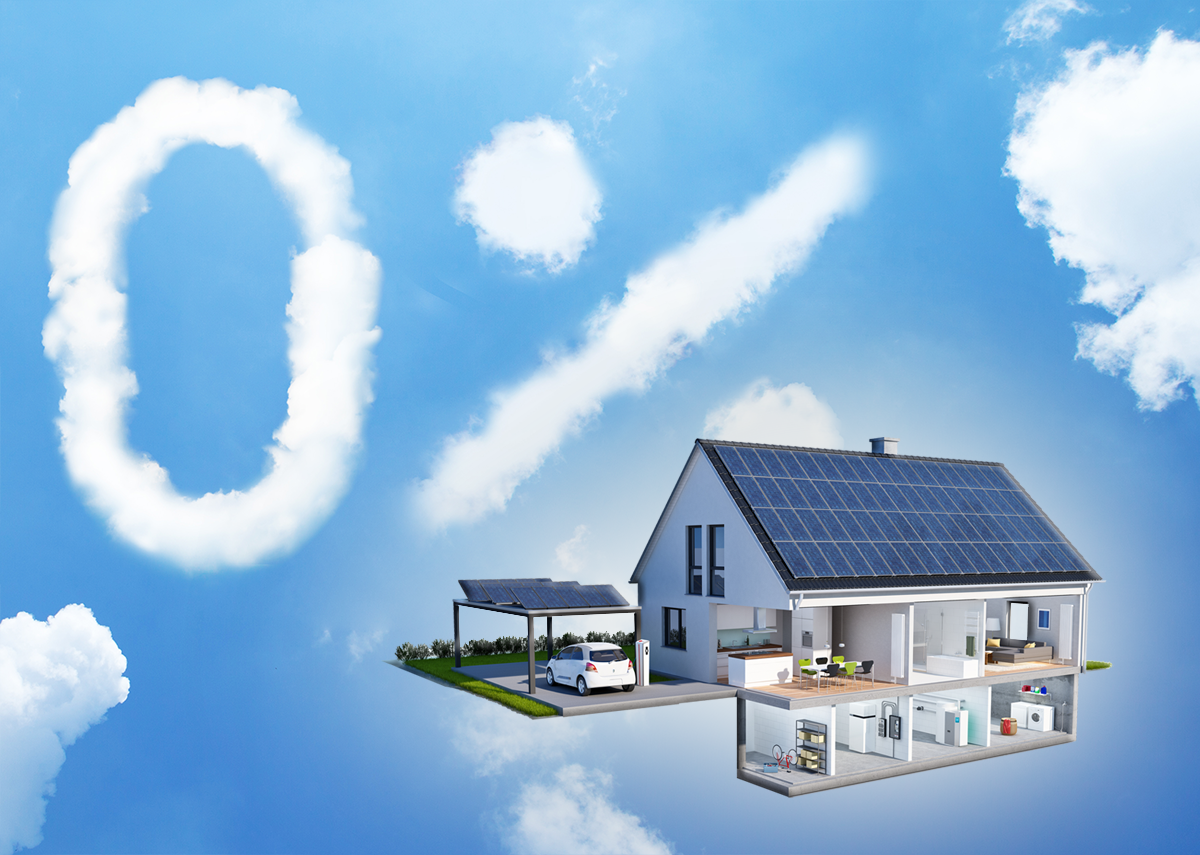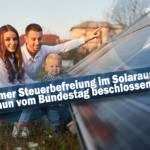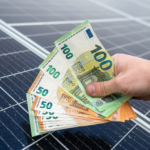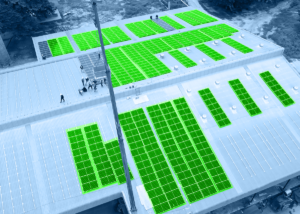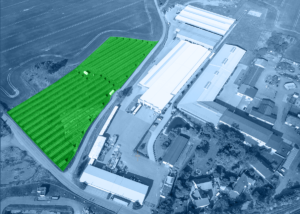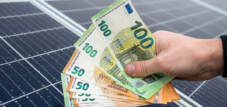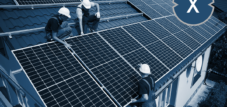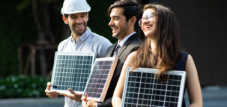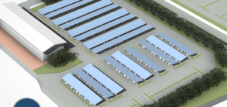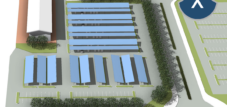30 kWP presumption control - tax rate with 0 % sales tax 'VAT' for solar systems - the solar system input tax deduction option
Language selection 📢
Published on: December 14, 2022 / update from: December 14, 2022 - Author: Konrad Wolfenstein
The Federal Council's approval of the 2022 Annual Tax Act is still pending, but is expected to take place on December 16, 2022. More on this below about the current progress in the federal legislative process.
The Annual Tax Act 2022 (Section 12 Para. 3 UstG new) offers a tax reduction of 0% for the supply of solar modules, including the components (e.g. inverters, but not the substructure) and electricity storage for the operation of a photovoltaic system, if they are on or installed near private homes, apartments as well as public and other buildings used for the common good. According to the market master data register, the installed gross output of the photovoltaic system may not be more than 30 kWp.
In addition, the DIHK (German Association of Chambers of Industry and Commerce) is trying to get further details clarified as quickly as possible from the Federal Ministry of Finance. There is currently no more information available than what is presented here.
The current development
The current course of the federal legislative process
Suitable for:
Tax exemption: Tax hammer for solar expansion now approved by the Bundestag!
Suitable for:
Top selling point for solar installers: No more tax on solar systems
Suitable for:
The subtle difference between tax exemption and zero tax rate
A '0 % tax rate' differs from a tax exemption in the sense that the performing entrepreneur does not raise sales tax on his service fee (e.g. sale), but for all initial benefits (e.g. purchasing) that are related to its performance can claim full input tax deduction.
How does it work with the 0% tax rate - input tax & sales tax?
Zero rate only for services to operators or end customers
End customer = customer for whom a product or service is ultimately intended, also called consumer or consumer.
The reduction in the tax rate to 0% only applies to the services provided to the operator of the photovoltaic system (usually the end consumer or private households). Deliveries from manufacturers, wholesalers or retailers to people and companies who are not operators of the photovoltaic system are still subject to the standard tax rate.
The application of the 0% tax rate is limited to the following services (according to Section 12 Para. 3 UStG):
- Delivery of solar modules including the components necessary for the operation of a solar system, as well as electricity storage devices to the operator of the solar system. This applies if the solar system is installed on or near private homes, apartments, public and other buildings that are used for activities serving the public good.
- The intra-community acquisition of favored items.
- The import of favored parts.
- The installation of preferential systems and electricity storage systems.
19% tax rate application example for companies
Purchasing a solar module from a wholesaler. The solar module costs €120 net. (Wholesaler's gross invoice amount = €120 + €22.80 / 19% VAT)
Here, an input tax (19%) of €22.80 (from the purchase price of €120) is incurred by the purchasing dealer.
The dealer now sells the solar module for €160 net, plus the 19% VAT to the end customer. That's a total of €190.40 (including €30.40 from 19% VAT).
The sales tax is therefore stated on the invoice that is created when a sale or service is completed, while the input tax is noted on the purchase invoice.
The dealer therefore has a tax liability of €30.40 minus the €22.80 input tax that was already paid to the wholesaler.
This leaves a remaining tax liability of €7.60.
This must be reported to the tax office in the next VAT return, which will then be collected by the tax authority.
0% tax rate application example for companies
Purchasing a solar module from a wholesaler. The solar module costs €120 net.
Here, an input tax (19%) of €22.80 (from the purchase price of €120) is incurred by the purchasing dealer.
The dealer now sells the solar module to the end customer for €160, with regard to the 30 kWp presumption regulation. The customer will therefore not be charged any further tax costs. The sales tax is 0% and 0 €.
VAT is a so -called consumption tax. It is also called 'VAT.
The dealer is now entitled to an input tax refund that has already been paid to the wholesaler.
The input tax of €22.80 that has already been paid to the wholesaler can be reclaimed from the tax office via the next advance VAT return.
What is the advance sales tax return?
Many entrepreneurs have to submit advance sales tax returns monthly or quarterly, among other things in order to report and pay sales tax that has already been incurred to the tax office or to receive a refund in the event of an excess input tax. In the sales tax return after the end of a calendar year or a possibly shortened period, the sales tax advance payments already made will be taken into account.
Meaning and purpose
Sales tax is an annual tax. By submitting advance sales tax returns, on the one hand the state has a lower risk of non-payment and gains an interest rate advantage, and on the other hand, the entrepreneur can distribute his sales tax burden more evenly over the entire year and thus avoid payment difficulties at the beginning of the following year. Conversely, the entrepreneur has an interest advantage on input tax refunds.
Period, deadline and extension of deadline
The submission period for the advance VAT return generally depends on the VAT payment burden for the previous year. The tax office determines the tax obligation; If the submission period changes, the entrepreneur will receive a notification. In principle, the pre-registration period is the calendar quarter. However, if the previous year's sales tax burden does not exceed €1,000, the tax office can exempt the entrepreneur from the obligation to submit advance returns and pay advance payments for the following calendar year. If the previous year's sales tax payment was more than €7,500.00, the advance sales tax return must be prepared monthly in the following year. Newly founded companies must always submit monthly advance registrations for the first two years (Section 18 (2) UStG).
If the total surplus from reimbursements exceeds €7,500, the entrepreneur can voluntarily submit monthly advance declarations. With the exception of this regulation, the submission period cannot be freely chosen (Section 18 Paragraph 2a UStG).
The pre-registration must be submitted to the responsible tax office by the 10th day after the end of a pre-registration period.
Upon request, a permanent extension of the deadline can be granted, so that the deadline for submitting an advance registration is extended by one month (§ 46 UStDV). The application for a permanent extension of the deadline does not require any justification.
If there is a monthly registration requirement and a permanent extension of the deadline, a special advance payment of 1/11 of the total of the previous year's advance payments must be made once a year. For newly founded companies, the special advance payment is based on the expected sales in the year of founding and in the following year based on the total sales of the previous year extrapolated to a calendar year (§ 47). The special advance payment will be offset against a payment burden for the December pre-registration period. If registration is required quarterly, no special advance payment is required.
Reporting character and form of transmission
The taxpayer must calculate the sales tax burden or refund himself (self-assessment levy), state it in an advance sales tax return, submit this to the tax office and pay any sales tax on time. Due to the self-calculated tax, sales tax is a registration tax (Section 150 Paragraph 1 Sentence 3 AO). This means that it essentially corresponds to a self-assessment tax. The submission of the advance sales tax return is equivalent to a tax assessment subject to verification (Section 168 sentence 1 AO). If the tax registration leads to a remuneration or the reduction of a tax that has already been paid, it is only equivalent to a tax assessment if the responsible tax authority agrees (Section 168 sentence 2 AO).
Until 2004, the data was transmitted using a registration form on paper or voluntarily electronically; since 2005, pre-registration has been mandatory online via the ELSTER system. For this purpose, either the ELSTER portal can be used directly or the software from third-party providers can be used. Electronic transmission was already possible years before the ELSTER process was introduced. The basis for this was the “Ordinance on the submission of tax returns on mechanically usable data carriers and via remote data transmission” (Tax Registration Data Transmission Ordinance - StADÜV of October 21, 1998).
Since January 1, 2013, electronic transmission must be authenticated.
If it is not possible to submit the tax return electronically, an advance sales tax return can still be submitted in paper form under certain conditions (hardship case).
What is the 30 kWp presumption regulation?
According to the DIHK, suppliers and installers of PV systems will in future have to differentiate whether they are small systems to which the zero tax rate applies or not.
Due to the 30 kilowatt peak presumption regulation, suppliers and installers of PV systems generally do not to inform the buyer about the type of use of the building. However, documentation is required that the relevant system is a system below 30 kilowatt peak (kWp).
It is not yet clear whether a simple note on the invoice that the purchase is for a system under 30 kWp is sufficient.
📣 Solar solutions for industry, retail and municipalities
Everything from a single source, specially designed for solar solutions for large parking areas. You refinance or counterfinance into the future with your own electricity generation.
👨🏻 👩🏻 👴🏻 👵🏻 For private households
We are from the region! We advise, plan and take care of the installation. We have interesting solar solutions for you. From the roof to the terrace to your car parking space
🎯 For solar engineers, plumbers, electricians and roofers
Advice and planning including a non-binding cost estimate. We bring you together with strong photovoltaic partners.
- Warehouses, production halls and industrial halls with their own power source from a photovoltaic roof system - Image: NavinTar|Shutterstock.com
- Industrial plant with its own power source from an outdoor photovoltaic system - Image: Peteri|Shutterstock.com
- Plan solar systems with photovoltaic solutions for freight forwarding and contract logistics
- B2B solar systems and photovoltaic solutions & advice
- Plan photovoltaics for warehouses, commercial halls and industrial halls
- Industrial plant: Plan a photovoltaic open-air system or open-space system
- Plan solar systems with photovoltaic solutions for freight forwarding and contract logistics
- B2B solar systems and photovoltaic solutions & advice
That's why with Xpert.Solar your photovoltaic system advice, planning and installation: The roof solar system with electricity storage, solar terraces and/or solar carports!
I would be happy to serve as your personal advisor.
You can contact me by filling out the contact form below or simply call me on +49 89 89 674 804 .
I'm looking forward to our joint project.
Xpert.Digital – Konrad Wolfenstein
Xpert.Digital is a hub for industry with a focus on digitalization, mechanical engineering, logistics/intralogistics and photovoltaics.
With our 360° business development solution, we support well-known companies from new business to after sales.
Market intelligence, smarketing, marketing automation, content development, PR, mail campaigns, personalized social media and lead nurturing are part of our digital tools.
You can find out more at: www.xpert.digital – www.xpert.solar – www.xpert.plus



